|
|
|
Sort Order |
|
|
|
Items / Page
|
|
|
|
|
|
|
| Srl | Item |
| 1 |
ID:
112735
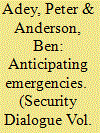

|
|
|
|
|
| Publication |
2012.
|
| Summary/Abstract |
In this article, we examine contemporary 'resilience' through UK preparedness - an apparatus of security enacted under the legal and organizational principles of UK Civil Contingencies and civil protection legislation and practices. By examining the design, practices and technologies that constitute the exercises performed within Civil Contingencies, the article first suggests that the manner in which exercises have been mobilized as examples of preparedness and apocalyptical imaginations of the 'unthinkable' should be understood within the highly specific societal and political contexts that shape them. More substantially, the article then provides a nuanced understanding of the life of the security assemblage through an in-depth analysis of the exercise and its design, materials, play and contingent relations. Seeking to deepen and widen concerns for what matters in security studies, animated by concern for objects, bodily affects, contingencies and excess, the article contends for a more serious concern with how security and its practices can surprise, shock, enthral and disrupt in a manner that need not only be associated with failure.
|
|
|
|
|
|
|
|
|
|
|
|
|
|
|
|
| 2 |
ID:
112739
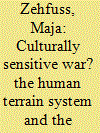

|
|
|
|
|
| Publication |
2012.
|
| Summary/Abstract |
Since around 2005, efforts have been made within the US military to highlight the significance of culture or the 'human terrain' for counterinsurgency operations. The US Army responded to the asserted 'cultural knowledge gap' by establishing an experimental programme called the Human Terrain System (HTS), which involves deploying social scientists alongside combat forces. While HTS was received favourably in the US mainstream media, it has been fiercely criticized by anthropologists in particular, who argue not least that participation in the programme would constitute a violation of their professional ethics, which require them to protect their research subjects. This article explores the anthropologists' critique and its limitations, arguing that it fails to tackle the problem of ethics deployed as a supposedly extra-political standard that can serve to (de)legitimize political projects. In particular, it is unable to dislodge the fantasy of protection at the heart of the argument for HTS.
|
|
|
|
|
|
|
|
|
|
|
|
|
|
|
|
| 3 |
ID:
112736
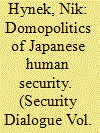

|
|
|
|
|
| Publication |
2012.
|
| Summary/Abstract |
Japan's approach to human security has commonly been regarded as progressive, imbued with liberal internationalist commitment. In this article, I offer an alternative and critical perspective on Japanese human security, arguing that the mainstream understanding neglects some important features of the phenomenon. I pay attention to the tight links between Japanese discourses and practices of international development and humanitarian assistance, refugee policy, counter-terrorism, and NGO regulation. So far, these issue areas have only been examined separately in the literature, thereby obscuring the strong affinities of human security to national security and non-liberal bureaucratic control. I argue that once the international and the domestic sides of Japanese human security are studied together, the approach can no longer be understood as resting on a combination of liberal values and 'Asian' values. Instead, it needs to be studied through a domopolitical diagram concerned with national security - that is, governance in the image of the home, linking citizenship, state and territory. After an initial discussion of the notion of domopolitics and its conceptual extension to the Japanese context, the article investigates the domopolitical relationship between Japanese human security as practised in Afghanistan and Japan's domestic refugee policy. It continues by examining the emergence of juridico-bureaucratic administration of NGOs within the domestic context and its subsequent extension to the area of Japanese human security, before ending with a few concluding remarks.
|
|
|
|
|
|
|
|
|
|
|
|
|
|
|
|
| 4 |
ID:
112737
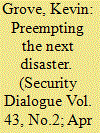

|
|
|
|
|
| Publication |
2012.
|
| Summary/Abstract |
The 2007 launch of the Caribbean Catastrophic Risk Insurance Facility (CCRIF) introduced a new mechanism of state security against the uncertainties of climate change. Proponents argue that increasing the ability of member-states to finance disaster recovery through catastrophe insurance mitigates the effects of increasingly frequent and intense hurricanes and thus contributes to climate change adaptation. In contrast, I offer a critical analysis of the CCRIF that draws out how it facilitates what I call the 'financialization of disaster management'. The introduction of financial logics and techniques enables the state and capital to visualize a population's self-organizing adaptive capacity as both a threat to state-based forms of order and a value that can be leveraged on capital markets as catastrophe risk. Leveraging enhances a state's ability to repair its critical infrastructure and preemptively negate undesirable adaptations. The CCRIF blends risk pooling with parametric insurance techniques to turn the uncertainty surrounding a population's immanent adaptability into catastrophe risks that can be leveraged to enhance state security and capital accumulation in an emergent environment.
|
|
|
|
|
|
|
|
|
|
|
|
|
|
|
|
| 5 |
ID:
112738
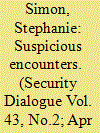

|
|
|
|
|
| Publication |
2012.
|
| Summary/Abstract |
Photographers have become common targets of security practice in the public spaces of US and UK cities. The securitization of photography - where photographers are commonly stopped, questioned, told to surrender film or delete photos, and in some cases arrested - rests upon the invocation of a post-9/11 context and the preemptive security logics that characterize the 'war on terror'. Here, the spatio-temporality of the photograph and the photo-taking subject are in tension with preemptive security stances in which everyday, ordinary actions - such as photography - are rendered suspicious and worthy of potential intervention. Using examples of specific encounters between photographers and security personnel, this article interrogates the conduct of these interventions and the preemptive security stance that scopes ordinary actions and everyday urban spaces through flexible and dispersed acts. Finally, the article considers how this uncoordinated and dispersed practice travels across a wide variety of actors without clear, causal linkages. The practice is a mobile, circuitous one, and through its analysis the article argues for more attention to be paid to everyday, embodied, and dispersed practices of preemption.
|
|
|
|
|
|
|
|
|
|
|
|
|
|
|
|
|
|
|
|
|